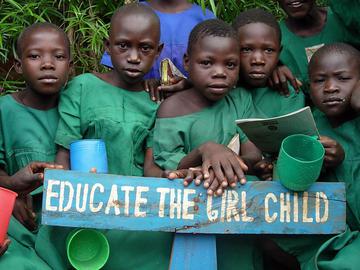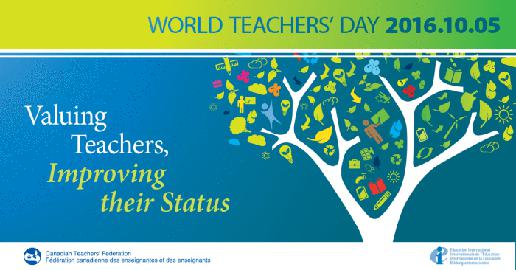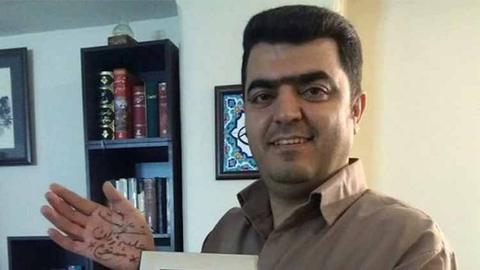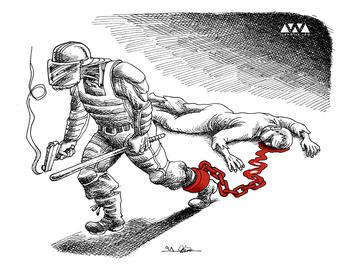As part of its global outreach to support teachers, Canada’s biggest teachers’ alliance has spoken out about the treatment of Iranian teachers, expressing shock about their imprisonment and about the fact that they were not allowed to attend an educational World Congress in Ottawa in 2019.
In July 2019, the Canadian Teachers’ Federation (CTF) spoke up in support for Esmail Abdi, an imprisoned teachers’ activist, and the CTF’s president spoke of Iranian teachers “being jailed for asking for the right to associate with or to be protected by a union” and Iran’s routine denial of teachers’ rights.
The Canadian Teachers’ Federation (CTF) is the largest national alliance of teachers in Canada, representing over 277,000 educators across the country. A member of Education International, a global union federation of teachers’ trade unions, the CTF liaises with federal departments and organizations working in the fields of education, children, and youth. As a federation dedicated to defending the rights of teachers, CTF’s mission statement sets out its commitment to support its member organizations: “When member organizations head into negotiations, we provide information from across the country on teacher salaries, pensions, and the full spectrum of benefits," CTF president Shelly Morse told IranWire. "Our research on education issues like workload, demographics, testing, and funding helps our member organizations provide stronger representation for teachers.”
In her interview with IranWire, Morse outlined the federation’s achievements, the challenges it has faced, and the international solidarity campaigns it has helped champion.
A Long Tradition of Advocacy and Achievements
The CTF has been in existence for almost 100 years, advocating for teachers’ rights in Canada. So what has made the federation so durable? “Overall, this achievement is tied to continued solidarity, from coast to coast [in Canada] over the last 100 years. We’ve seen many challenges, but those challenges have kept us together,” Morse says. “Our achievements, in terms of what we provide for teachers, are an increased influence with government, better salaries and working conditions, professional development opportunities, service opportunities, and direct protections in difficult times.”
Influence on the Government
The capacity for civil society organizations and unions to exert influence on the government has been a key factor in most healthy democracies, and the CTF’s influence is part of this positive trend. “When we lobby or when we do advocacy work, or whenever we see something that is likely to be detrimental to our members, we try to get in front of it,” Morse says. “We try and work with the government to make their demands less of a burden on our teachers.”
There are concrete examples of CTF’s advocacy with the government. One of them is CTF’s protection of educational material, and its push to ensure teachers and students had access to public information as well as copyright-protected materials to boost learning processes. “In fact, the copyright law was going to infringe on what teachers were doing in the classroom and it was going to be very strict,” says Morse. “We did a lot of lobbying and we met with a lot of government officials. Finally, we got them to change the copyright law to better reflect teachers’ needs."
Addressing Violence and Inequality
Morse outlines that one of the biggest challenges of a federal political system is to ensure a high standard of education across the entire country. In Canada, most of the education system falls under the jurisdiction of individual provinces and territories, which each have their own education systems. “We are always looking to try and ensure that our provinces and territories have adequate funding and resources for public education,” Morse says. “There’s a chronic underfunding of education systems in Canada...We work to strengthen labor rights and advance union renewal. We also advance social justice in Canada and around the world with our work.”
Urging their members to look for accountability to advance teachers’ rights has been a way for the CTF to tackle the challenges at a more grassroots level. “During this election [in October 2020], we had a campaign called ‘I teach I vote.’ We did it in the last federal election as well. We asked teachers, when candidates came to their door, to urge political parties to end poverty, address mental health issues, support strong union and labor rights, lead the way on sustainable climate action, and make gender equality a reality.”
While Canadian provinces have individual teaching federations, the CTF represents the collective rights of all of them across the country. “We are the umbrella organization,” Morse says. “So we lobby their issues on a federal level. Provinces, on the other hand, would lobby for whatever is going on in their province or territory. We represent 277,000 teachers.”
Given that Canada’s federal system is vast, it could be tempting to think that each province and territory would have different needs. But Morse says there are shared need across the different education systems. “You would be shocked as to how much the needs in the education system are the same from province to province to territory. Of course, they have differences as well, but we pushed for increased working conditions.”
Violence in the classroom, for example, is an issue that many of Canada’s provinces and territories have experienced. “This year, we will be looking at violence in the classroom; that has increased significantly over the years, especially with the concept of social media,” Morse says. “That is creating difficult times in our classroom. So we work to help them work through the issues that they see in their provinces, but a lot of times, the issues are the same. There isn’t a province or territory which could say, ‘Oh! We don’t have to worry about that.’”
There have been many cases where school boards refrain from keeping statistics of violence in their territories for the sake of not tarnishing the reputation of the school. “More often than not, our boards are told to tell schoolteachers and administrators not to report it,” Morse says. “If you talk about it, then you might get reprimanded from your board. I know in Nova Scotia, where I was a teacher and the president of the Nova Scotia Teachers’ Union, we had a reporting system that was developed by the government. Because of what happened to Rehtaeh Parsons – she was a young girl who committed suicide over an incident that happened at a house party. That brought to light some of the violence that was happening inside and outside of the schools. The government eventually came up with a system. But the government doesn’t want to deal with it. I think they were shocked at the amount of incidents that were reported. A couple of years ago, it was reported that 4,720 incidents of violence had been reported by teachers. I call the violence at the workplace ‘the silent crisis’ because our employer doesn’t want us to talk about it and they don’t want to admit that it is happening. Simply, they are not dealing with it.”
International Solidarity
The CTF offers support and solidarity to teachers worldwide. As Morse points out, “When we went to the [Education International] World Congress, we certainly got out and spoke regarding atrocities that are happening to teachers across the world. Moreover, one of our new projects that we have just started is the Simameni [Project] in Uganda. We are working on a project with the Ugandan National Teachers’ Union. The Simameni, which means ‘stand up’ [in Swahili] aims to improve learning conditions of girls in Ugandan secondary schools, but it also works to help increase access and participation in the completion of quality of public education. The Canadian government has given us $1.9 million for five years to support that project.” The project got underway in 2019.
Morse also highlights other international work undertaken by the CTF as part of the Project Overseas initiative. The initiative sends “teachers every year to developing countries to give [the teachers in these countries] the strategies to become better teachers and to deliver quality education. That has been in existence since 1962.” In 2019, the CTF sent out 57 teachers, while over the years, the Project Overseas has covered more than 50 countries in Africa, Asia, the Caribbean and the South Pacific.
Solidarity for Iranian Teachers’ Activists
Given the harsh and repressive conditions in Iran, a number of workers and teachers demanding reasonable pay, or even to be paid at all have been subjected to severe crackdown across the country. Morse sends out her message of solidarity for Iranian teachers and union activists: “Certainly, we stand behind all teachers globally and, through our work with Education International, we will be promoting solidarity for those teachers.”
On an anecdotal note, Morse says, “When we had the [Education International] World Congress here in Ottawa [in July 2019], there was an Iranian teacher who had been imprisoned [Esmail Abdi] and we tried to protest outside of the conference center in support of those teachers and their rights to associate with unions and the right to speak out on the atrocities happening to teachers.” She notes: “[Iranian teachers] were not allowed to come to the World Congress because they had been imprisoned before they could come. So we had a protest about the fact that teachers were being jailed for asking for the right to associate with or to be protected by a union. We certainly stand in solidarity with anyone who is being denied their rights.”
Related Coverage:
Canadian Union Pledges Unconditional Support and Solidarity for Iranian Workers
“We are appalled that people are incarcerated for their beliefs”
110 Years in Prison for 7 Labor Activists
Haft-Tappeh Workers Appeal to International Labor Organization
visit the accountability section
In this section of Iran Wire, you can contact the officials and launch your campaign for various problems





























comments